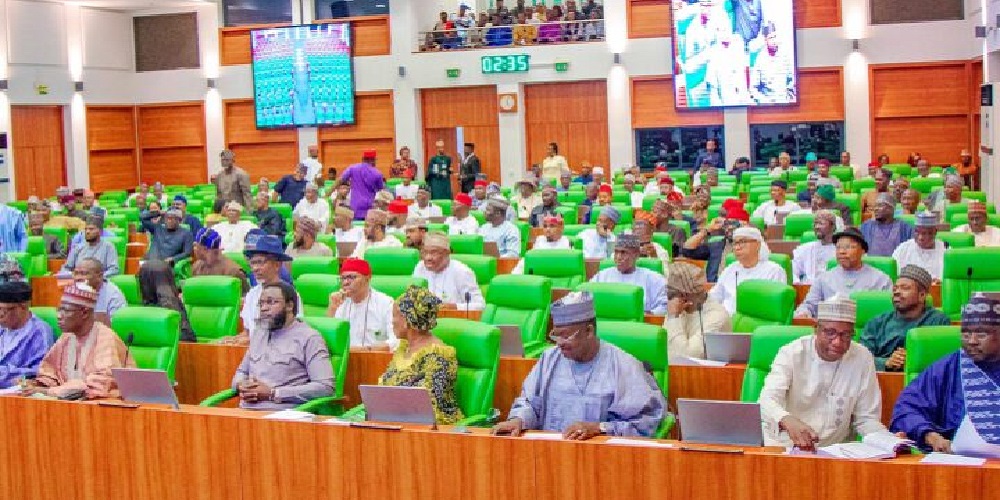News
Reps Okay State Police Bill For Second Reading

News
At last, Tinubu sacks five ministers, makes seven fresh nomination

By Francesca Hangeior.
At last, president Bola Tinubu has reshuffle his cabinet appointing seven new ministers.
This development is coming few months after growing calls for the President to rejig his cabinet.
In a statement issued by the presidency after the federal executive council (FEC) meeting on Wednesday, president Tinubu re-assigned 10 ministers to new ministerial portfolios and appointed seven new ministers for Senate confirmation.
The president on Wednesday, during the Federal Executive Council (FEC), announced the sack of Uju-Ken Ohanenye as Minister of Women Affairs; Lola Ade-John as Minister of Tourism; Tahir Mamman as Minister of Education; Abdullahi Gwarzo as Minister of State, Housing and Urban Development; and Jamila Ibrahim as Minister of Youth Development.
Tinubu subsequently nominated Bianca Odumegu-Ojukwu as the Minister of State Foreign Affairs, while Nentawe Yilwatda as the Minister of Humanitarian Affairs and Poverty Reduction, officially bringing an end to the tenure of suspended Betta Edu.
The President also nominated Maigari Dingyadi as the Minister of Labour and Employment, Jumoke Oduwole as the Minister of Industry, Idi Maiha as Minister for the newly created Livestock Development Ministry, Yusuf Ata as the Minister of State, Housing and Urban Development, with Suwaiba Ahmad as Minister of State Education.
Earlier on Wednesday, the President scrapped the Ministry of Nigeria Delta Development and announced the Ministry of Regional Development as a replacement to oversee the activities of all the regional development commissions.
The regional development commissions to be under the supervision of the new Ministry are the Niger Delta Development Commission, the South East Development Commission, the North East Development and the North West Development Commission.
Tinubu also scrapped the Ministry of Sports Development and transferred its functions to the National Sports Commission to “develop a vibrant sports economy”.
The President further approved the merger of the Federal Ministry of Tourism and the Federal Ministry of Arts and Culture to become the Federal Ministry of Art, Culture, Tourism and the Creative Economy.
“The appointment of Shehu Dikko as Chairman of the National Sports
Commission.
“The appointment of Sunday Akin Dare as Special Adviser to the president on Public Communication and Orientation working from the ministry of Information and National Orientation,” the President said.
The President appreciated the outgoing members of the Federal Executive Council for their service to the nation while wishing them the best in their
future endeavours.
He then charged the newly appointed ministers as well as their reassigned colleagues to see their appointment as a call to serve the nation.
He added that all appointees must understand the administration’s eagerness and determination to set Nigeria on the path to irreversible growth and invest the best of their abilities into the actualisation of the government’s priorities.
It could be recalled that Tinubu, the All Progressives Congress (APC) chieftain, appointed 48 ministers in August 2023, three months after his inauguration.
The Senate immediately screened and confirmed the ministers. One of the ministers, Betta Edu, was suspended in January while another, Simon Lalong, moved to the Senate.
There have been growing calls for the President to reshuffle his cabinet as many Nigerians are not impressed by the performance of some of the ministers, especially in the face of unprecedented inflation, excruciating economic situation and rising insecurity.
In September, presidential spokesman Bayo Onanuga said the President would reshuffle his cabinet but didn’t give a time to the reorganisation.
News
Reps To Consider Increase In Derivation Fund From 13% to 50%

News
Reps Pass For Second Reading Bill To Create National Honours Award Commission

-

 News21 hours ago
News21 hours agoReps Pass For Second Reading Bill To Create New Oyo State
-

 News21 hours ago
News21 hours agoReps Examine Bill Seeking Military Involvement In Farming, Ranching
-

 News6 hours ago
News6 hours agoDeath Toll Hits 181, another 80 in Critical Condition in Hospital
-

 News15 hours ago
News15 hours agoJust in; FG to remove VAT on essential commodities
-

 News21 hours ago
News21 hours agoReps Want 50% Agricultural Lending For Small Holder Farmers
-

 News21 hours ago
News21 hours agoConstitution Review: Reps to Engage NGF, NGE, LG Chairmen, CSOs, Others
-

 Politics15 hours ago
Politics15 hours agoJust in: Palaver in PDP nosedives as court halts Mohammed and co from holding NEC meeting
-

 Economy15 hours ago
Economy15 hours agoIMF Revises Nigeria’s 2024 Economic Growth Forecast Downward to 2.9%






